Many people start with Atarax (hydroxyzine) because it’s cheap, widely available, and helps with both anxiety and itching from allergies. But after a few weeks, questions pop up: Is this really the best option? Are there safer, faster, or more effective alternatives? If you’re wondering whether to stick with hydroxyzine or switch, you’re not alone. Let’s break down how Atarax stacks up against other common choices - no fluff, just real comparisons based on how people actually use them.
What Atarax (Hydroxyzine) Actually Does
Hydroxyzine is an older antihistamine that works by blocking histamine receptors. But unlike newer ones like cetirizine or loratadine, it also affects brain chemicals like serotonin and dopamine. That’s why it helps with anxiety, nausea, and even trouble sleeping - not just runny noses or hives. It’s not a benzodiazepine, but it can feel similar in calming effects, especially at higher doses (50-100 mg).
It’s often prescribed for:
- Short-term anxiety relief
- Itching from eczema, hives, or insect bites
- Sedation before medical procedures
- Off-label use for insomnia
But here’s the catch: it makes you drowsy. A lot. And that drowsiness doesn’t fade quickly for everyone. Some people feel foggy for hours after taking it. If you work, drive, or care for kids, that’s a big deal.
Top Alternatives to Atarax
There are four main categories of alternatives: newer antihistamines, SSRIs, benzodiazepines, and natural options. Each has different pros and cons.
1. Cetirizine (Zyrtec) and Loratadine (Claritin)
These are the go-to allergy meds for most people. They’re non-drowsy (or much less drowsy) and safe for daily use. But they don’t touch anxiety. If you only need help with itching or sneezing, they’re better than hydroxyzine - no brain fog, no next-day grogginess.
But if anxiety is your main issue, these won’t help. Hydroxyzine wins there. Cetirizine and loratadine are for allergies only. You can’t swap them for Atarax and expect the same calming effect.
2. Sertraline (Zoloft) and Escitalopram (Lexapro)
These are SSRIs - the first-line treatment for chronic anxiety. Unlike hydroxyzine, they don’t cause immediate drowsiness. But they take 4-6 weeks to kick in. If you need relief fast, they’re not the answer. But if you’re dealing with generalized anxiety disorder, panic attacks, or social anxiety long-term, they’re far more effective than Atarax.
Hydroxyzine is a Band-Aid. SSRIs rebuild the foundation. Many doctors prescribe hydroxyzine while waiting for an SSRI to work. That’s fine. But staying on hydroxyzine for months? That’s not what it’s designed for.
3. Benzodiazepines (Lorazepam, Alprazolam)
These are stronger, faster, and more addictive than hydroxyzine. Lorazepam (Ativan) can calm panic in 20 minutes. Hydroxyzine takes 30-60 minutes and isn’t as powerful. Benzodiazepines are great for acute anxiety - like before a flight or during a panic attack.
But here’s the trade-off: they’re controlled substances. You can’t refill them easily. Dependence builds fast. Withdrawal can be dangerous. Hydroxyzine has no abuse potential. It won’t get you high. You won’t need higher doses over time to feel the same effect.
If you need something for occasional use and want to avoid addiction, hydroxyzine is safer. If you need something powerful and fast, benzodiazepines win - but only if you’re under strict supervision.
4. Natural Options: Magnesium, L-Theanine, Valerian Root
Some people turn to supplements because they hate pills or had bad side effects. Magnesium glycinate helps with muscle tension and sleep. L-theanine (found in green tea) promotes calm without drowsiness. Valerian root is a mild sedative - similar to hydroxyzine but weaker.
Studies show L-theanine can reduce stress markers in the blood. Magnesium helps people with low levels sleep better. But none of these are as strong as hydroxyzine. They’re support tools, not replacements. If your anxiety is severe, don’t swap Atarax for a capsule of valerian and expect the same result.
Comparison Table: Atarax vs Alternatives
| Medication | Best For | Onset of Action | Drowsiness | Dependence Risk | Daily Use Safe? |
|---|---|---|---|---|---|
| Hydroxyzine (Atarax) An antihistamine used for anxiety and allergic reactions | Anxiety, itching, sleep | 30-60 minutes | High | Very Low | Yes |
| Cetirizine (Zyrtec) Second-generation antihistamine for allergies | Allergies only | 1-3 hours | Mild to none | None | Yes |
| Sertraline (Zoloft) SSRI antidepressant for chronic anxiety | Chronic anxiety, OCD | 4-6 weeks | Low (initially) | None | Yes |
| Lorazepam (Ativan) Benzodiazepine for acute anxiety | Panic attacks, acute stress | 15-30 minutes | High | High | No |
| L-Theanine Amino acid from green tea for calm focus | Mild stress, focus | 20-40 minutes | None | None | Yes |
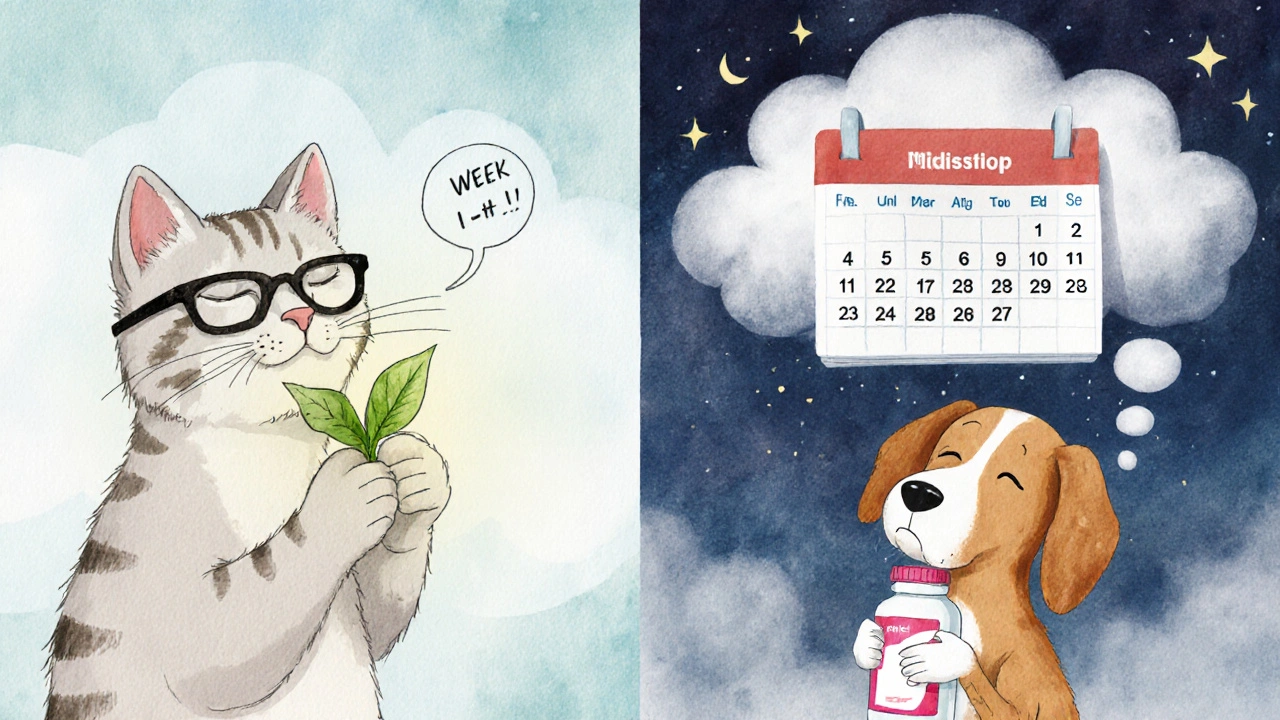
When to Stick With Atarax
You should keep using hydroxyzine if:
- You need something for occasional anxiety - like before a dentist appointment or public speaking
- You have both allergies and anxiety, and one pill covers both
- You can’t tolerate SSRIs (side effects like nausea or sexual dysfunction)
- You’re on a tight budget - hydroxyzine costs under £5 for a 30-day supply in the UK
- You’re using it short-term while waiting for another treatment to work
It’s not a bad drug. It’s just not always the right tool for the job.
When to Switch
Consider switching if:
- You’re taking hydroxyzine daily for more than 3 months - it’s not meant for long-term anxiety management
- You’re feeling foggy all day, even after a night’s sleep
- You’ve tried it for 2 weeks and it’s not helping your anxiety at all
- You need to drive, operate machinery, or care for children and the drowsiness is unsafe
- You’re looking for something that actually changes how your brain handles stress over time
If you’re on hydroxyzine daily and it’s not working, your doctor might suggest an SSRI. If you need fast relief for panic attacks, they might try a low-dose benzodiazepine - but only for a few weeks.
What Most People Don’t Realize
Hydroxyzine isn’t an anti-anxiety drug in the way SSRIs or benzodiazepines are. It’s a sedating antihistamine that happens to reduce anxiety as a side effect. That’s why it works for some and not others. People with high histamine levels - like those with chronic hives or eczema - often respond better. Others feel nothing but sleepy.
There’s no blood test to tell if you’ll respond. You have to try it. But if you’ve tried it and it’s not working, don’t keep pushing through the drowsiness. There are better options.
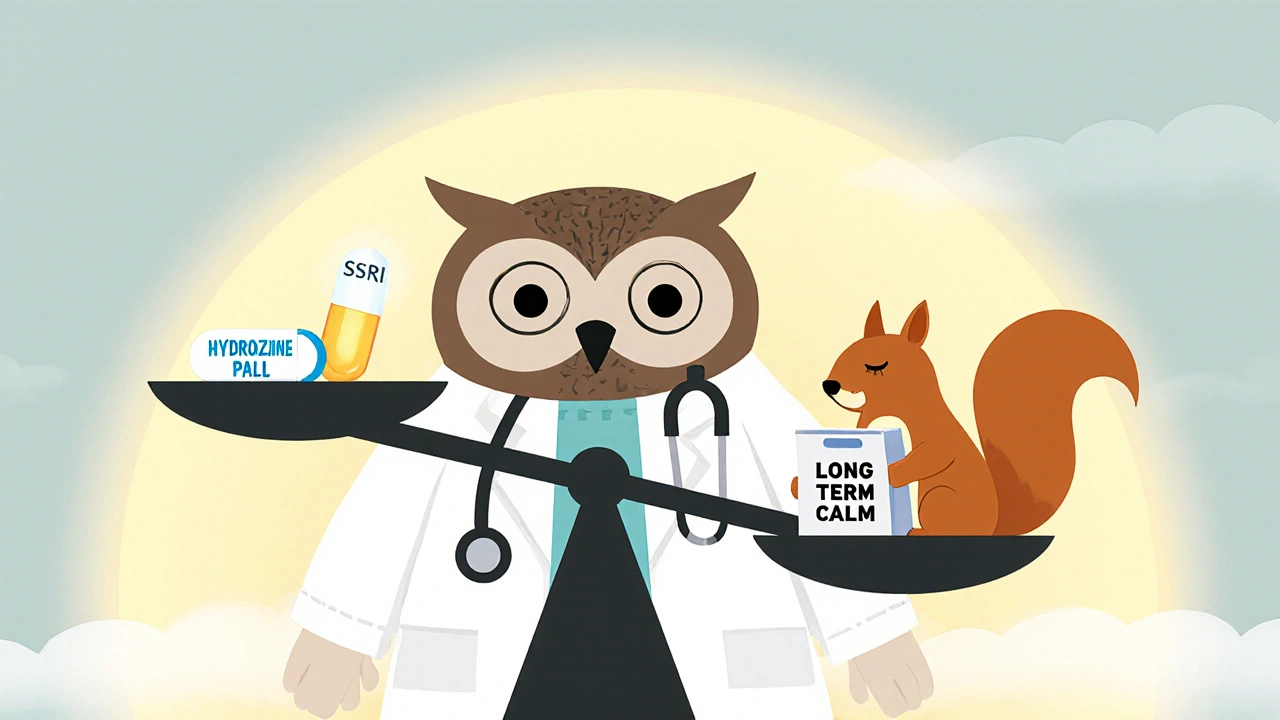
How to Talk to Your Doctor About Switching
Don’t just stop hydroxyzine cold. If you’ve been using it daily, taper slowly to avoid rebound anxiety or insomnia. Say this to your doctor:
- "I’ve been taking hydroxyzine for X weeks/months, but I’m still feeling anxious and I’m too tired to function during the day."
- "I’d like to explore options that don’t make me drowsy. What do you recommend?"
- "Could we try an SSRI? Or is there a non-sedating option for my allergies?"
Doctors know hydroxyzine is overused. They’re used to this conversation. Be clear about your goals: Do you want to sleep better? Stop itching? Feel calm without fog? That helps them pick the right alternative.
Final Thoughts
Hydroxyzine is useful - but only in the right context. It’s a good short-term fix for anxiety and allergies. But it’s not a long-term solution. If you’re relying on it every day, you’re probably masking a deeper issue that needs a different kind of treatment.
The best choice depends on your symptoms, lifestyle, and goals. If you need fast, occasional relief without addiction risk, hydroxyzine still has a place. If you want lasting change, an SSRI or therapy will do more. And if allergies are your only problem, ditch hydroxyzine and go for Zyrtec or Claritin.
There’s no one-size-fits-all here. But knowing what each option does - and doesn’t do - puts you in control.
Is hydroxyzine addictive?
No, hydroxyzine is not addictive. Unlike benzodiazepines or opioids, it doesn’t trigger dopamine surges or create physical dependence. You won’t need higher doses over time to get the same effect. Stopping it suddenly won’t cause withdrawal symptoms. That’s why it’s often used in hospitals for anxious patients who can’t take stronger drugs.
Can I take hydroxyzine with alcohol?
No. Alcohol makes hydroxyzine’s sedative effects much stronger. This can lead to extreme drowsiness, slowed breathing, or even loss of consciousness. Even one drink can be dangerous when combined with hydroxyzine. Avoid alcohol completely while taking it.
Does hydroxyzine help with sleep?
Yes, many people take it at night to help with sleep, especially if anxiety keeps them awake. But it’s not a true sleep aid like melatonin or zolpidem. It works by sedation, not by regulating sleep cycles. Long-term use can disrupt natural sleep patterns and leave you feeling groggy in the morning.
Is hydroxyzine safe for older adults?
It’s used less often in older adults because it increases the risk of falls, confusion, and urinary retention. The body clears it slower with age, so side effects last longer. Doctors usually prefer non-sedating options like SSRIs or low-dose buspirone for seniors.
Can I switch from hydroxyzine to an SSRI without tapering?
If you’re taking hydroxyzine occasionally, you can stop it right away. But if you’ve been using it daily for more than a few weeks, it’s safer to taper slowly - cut the dose by 25% every 3-5 days. Stopping abruptly can cause rebound anxiety or trouble sleeping. Always talk to your doctor before making changes.
What’s the cheapest alternative to hydroxyzine?
Loratadine (Claritin) is the cheapest alternative - often under £2 for 30 tablets in the UK. But it only treats allergies, not anxiety. If you need anxiety relief, hydroxyzine is still the most affordable option. SSRIs like sertraline are also cheap (around £5-£10/month), but take weeks to work. For fast, low-cost anxiety relief, hydroxyzine still wins.
Next Steps
If you’re unsure what to do next:
- Write down how often you take hydroxyzine and why - anxiety, allergies, sleep?
- Track your energy levels and drowsiness for 3 days.
- Ask yourself: Is this helping me live better, or just making me numb?
- Book an appointment with your GP or pharmacist. Bring your log.
- Ask: "What’s the best long-term solution for my symptoms?"
You don’t have to stay on a medication just because it’s been prescribed. You have the right to ask for better options - and there are plenty.

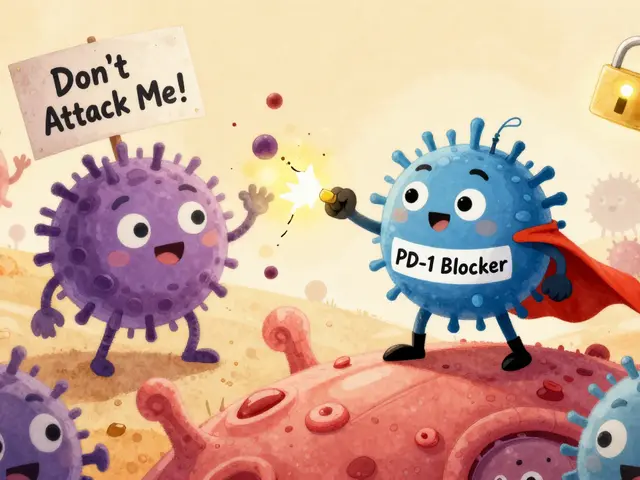

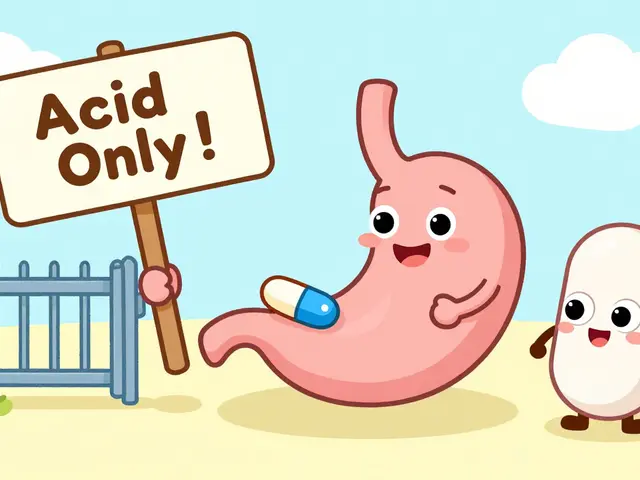

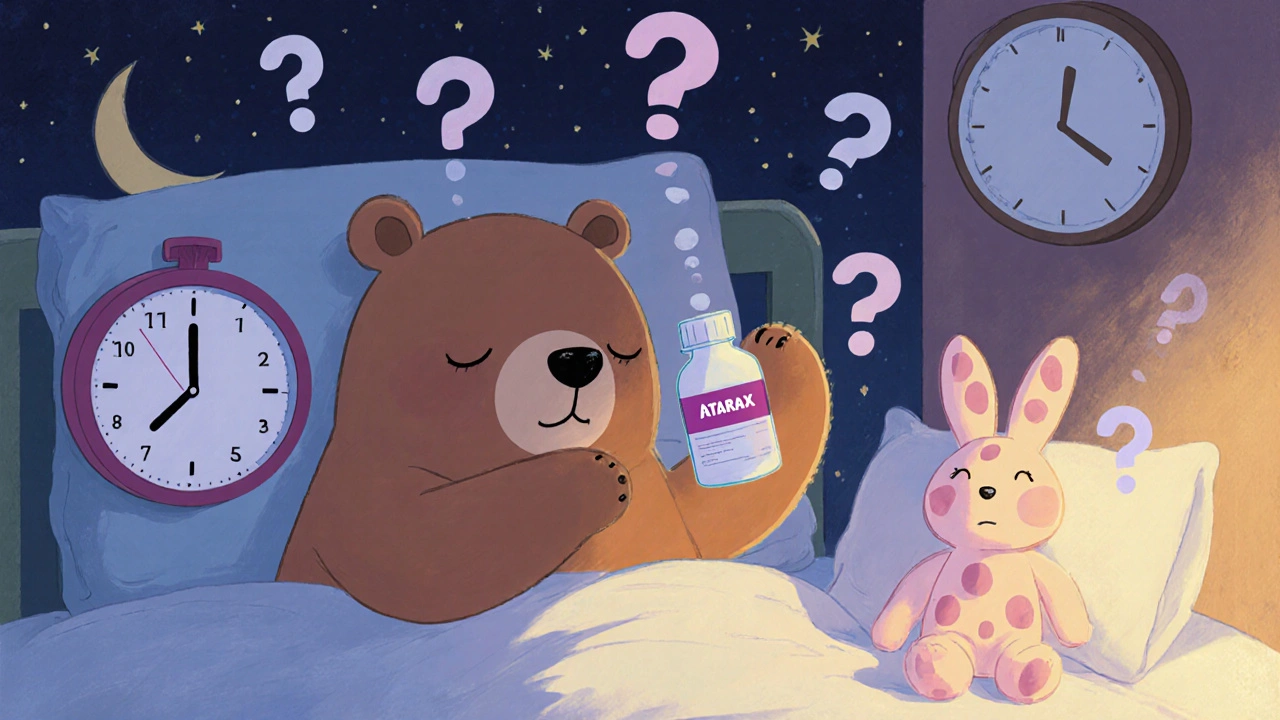
15 Comments
It’s wild how we treat hydroxyzine like it’s a cure-all when it’s really just a really sleepy band-aid. I get it - it’s cheap, it’s easy, and it makes the buzz go away for a few hours. But if you’re using it daily for months, you’re not treating anxiety, you’re just numbing it. Like putting duct tape on a leaky pipe and calling it a fix.
Real healing? That’s therapy. That’s SSRIs. That’s figuring out why your nervous system is stuck in overdrive. Hydroxyzine doesn’t teach you how to breathe. It just makes you too tired to care.
I used to take it every night. Felt like a zombie by noon. Switched to sertraline + daily walks. Took 6 weeks. Now I’m actually present. Not just quiet. Different thing.
Y’all are overcomplicating this. If you have allergies AND anxiety, hydroxyzine is a godsend. I’ve been on it for 2 years and I don’t feel foggy - I feel balanced. My eczema cleared up, my panic attacks dropped from 3x/week to once a month, and I sleep like a rock. No addiction, no withdrawal, no drama.
SSRIs made me nauseous and horny as hell. Benzodiazepines? I don’t trust controlled substances. L-theanine? Nice in theory, but I need something that works when I’m hyperventilating in a grocery store.
Don’t shame people for using what works. Not everyone has access to therapists or can afford $150/month prescriptions. Hydroxyzine is the people’s medicine.
THEY DON’T WANT YOU TO KNOW THIS BUT HYDROXYZINE IS A GOVERNMENT SLEEP DRUG DESIGNED TO MAKE PEOPLE DUMB SO THEY DON’T ASK QUESTIONS ABOUT THE MATRIX
EVERY SINGLE PHARMA COMPANY IS IN ON IT - THEY PUMP IT INTO WATER SUPPLIES IN SMALL DOSES SO YOU’LL BE TOO ZOMBIFIED TO NOTICE THE BILLIONS VANISHING FROM YOUR BANK ACCOUNT
AND WHY DO YOU THINK THEY PUSH SSRIs next? TO CREATE DEPENDENCE AND MAKE YOU PAY FOREVER FOR A DRUG THAT TAKES MONTHS TO WORK BUT THEY OWN THE PATENT
YOU THINK L-THEANINE IS SAFE? IT’S A COVER FOR NEUROCHEMICAL MANIPULATION BY BIG TEA
STOP TAKING ANYTHING FROM A DOCTOR WHO WORKS WITH A PHARMACEUTICAL REP
GO NATURAL OR GO DEAD
How quaint. You’re all treating hydroxyzine like it’s some kind of ethical dilemma in a 19th-century novel. The truth is, it’s a blunt instrument - effective, yes, but crude. The real issue isn’t whether it’s ‘safe’ - it’s whether you’re intellectually honest about your treatment goals.
If you’re using it for anxiety, you’re avoiding the harder work of cognitive restructuring. If you’re using it for allergies, you’re ignoring immunological root causes. The pharmaceutical industry doesn’t care if you’re functional - they care if you’re compliant.
And let’s be real - most people don’t have the metabolic resilience or the financial bandwidth to pursue ‘optimal’ care. So they settle. And that’s not a failure of will - it’s a failure of system design.
Stop romanticizing SSRIs. They’re just the new placebo with a better marketing team.
I think the real question isn’t which drug is better - it’s why we’ve reduced human suffering to a pharmacological menu.
We’ve turned anxiety into a product to be optimized, not a signal to be understood. Hydroxyzine sedates. SSRIs rewire. Benzodiazepines suppress. Supplements soothe. But none of them ask: Why are you so anxious in the first place?
Is it your job? Your childhood? The way you scroll until 2am? The loneliness built into modern life?
Medication isn’t evil. But when it becomes the only conversation we’re allowed to have - that’s when we’ve lost something vital.
I’m not saying ditch the pills. I’m saying: don’t let them replace your curiosity about yourself.
Hydroxyzine works for me. No drama. No side effects. I take 25mg at night. Sleep like a baby. Wake up fine. No fog. No crash. I’ve tried Zyrtec - useless for anxiety. Lexapro - made me feel like a robot. Ativan - too scary.
Why overthink it? It’s not addictive. It’s cheap. It does the job. If it ain’t broke don’t fix it.
Also - anyone else notice how everyone acts like SSRIs are some kind of holy grail? Bro they take forever. And the first month is hell. Hydroxyzine gets you through the waiting period. Smart.
Ugh I’m so tired of people acting like hydroxyzine is some kind of miracle drug. I was on it for 8 months and it made me feel like a zombie who forgot how to think. My partner left me because I couldn’t hold a conversation. I didn’t even notice until I stopped. Then I cried for 3 days because I realized I’d been numb the whole time.
And now I’m on sertraline and I’m finally feeling things again - even the hard ones. I’d rather be sad and awake than happy and hollow.
Also I hate how people act like benzodiazepines are the devil. If you’re having panic attacks in public, you don’t have time for a 6 week wait. Sometimes you need the fire extinguisher, not the fire prevention seminar.
There’s a critical distinction here that’s being overlooked: hydroxyzine is an antihistamine with secondary anxiolytic effects, not a true anxiolytic. Its mechanism is peripheral and central H1 receptor antagonism, not serotonergic modulation like SSRIs or GABAergic enhancement like benzodiazepines. This explains why efficacy varies wildly between individuals - particularly those with histamine dysregulation or mast cell activation syndrome.
Additionally, its sedative profile is dose-dependent and non-linear. At 10mg, it may cause minimal drowsiness; at 50mg, it can induce significant cognitive impairment. This makes titration essential. Most patients are prescribed 50mg without adequate education on pharmacokinetics.
Long-term daily use (>3 months) is not contraindicated per se, but it is off-label and lacks robust longitudinal data. The absence of dependence does not equate to absence of neuroadaptation - particularly in sleep architecture. Studies show reduced REM latency and increased stage 2 sleep with chronic use, which may contribute to non-restorative sleep.
For patients with comorbid allergic dermatitis and anxiety, hydroxyzine remains a pragmatic first-line option. For pure anxiety disorders, it should be viewed as a bridge, not a destination. The real clinical error is prolonging its use without reassessment.
Hydroxyzine is a first-generation antihistamine with significant anticholinergic burden - particularly problematic in patients with autonomic dysregulation or subclinical cognitive decline. Its half-life is prolonged in hepatic impairment, and CYP3A4/2D6 polymorphisms significantly alter metabolic clearance.
SSRIs, despite their delayed onset, demonstrate superior long-term outcomes in GAD and panic disorder per meta-analyses (Cipriani et al., 2018). Benzodiazepines, while potent, carry a 15% risk of dependence within 6 months - not negligible.
Supplements like L-theanine modulate alpha-wave activity but lack FDA-regulated bioavailability standards. The market is saturated with unverified formulations.
Bottom line: hydroxyzine is a stopgap. It is not a therapeutic strategy. Clinical inertia in prescribing it as monotherapy for chronic anxiety reflects systemic underinvestment in mental health infrastructure - not pharmacological wisdom.
Okay but have you tried magnesium glycinate + L-theanine combo? I was skeptical but after 3 weeks I’m literally calmer than I’ve ever been. No drowsiness, no brain fog, and I can actually focus at work. Hydroxyzine made me feel like I was underwater. I switched cold turkey and nothing happened. No rebound. No nothing. Just… peace.
Also - why are we so scared of natural stuff? People think ‘natural’ means ‘weak’ but that’s just pharma propaganda. Plants have been healing people for thousands of years. We just forgot how to listen.
And if you’re on SSRIs and still anxious? Maybe it’s not the med. Maybe it’s your life. Just saying.
bro i took hydroxyzine for 3 months and i swear i turned into a potato
like i couldnt even remember my own phone number some days
switched to lexapro and now i can watch a whole movie without zoning out
also l-theanine is legit but dont buy the cheap stuff on amazon - i got one that was just sugar and glitter lol
also dont mix with alcohol unless you wanna pass out in the shower again 🤡
In my experience as a community health worker, hydroxyzine is often the only accessible option for low-income patients with anxiety and chronic urticaria. We see it used daily not out of preference, but because alternatives are either unaffordable or require specialist referrals that take months to secure.
It is not ideal. But it is humane. To dismiss it as ‘just sedation’ ignores the reality that for many, any relief is better than none.
What we need is not judgment, but systemic change - affordable mental healthcare, better access to SSRIs, and insurance coverage for integrative therapies.
Until then, let’s honor the fact that people are doing their best with what they have.
Okay so I stopped hydroxyzine cold turkey after 6 months and I had panic attacks for 10 days straight. I thought it wasn’t addictive but apparently my brain thought otherwise. I had to go back on it because I couldn’t leave my apartment. Now I’m terrified to ever try to quit again. What’s the point of being ‘not addictive’ if your nervous system still implodes without it?
Also my doctor just shrugged when I asked about alternatives. Like I was asking for a unicorn.
Why is this so hard?
Hydroxyzine is a Trojan horse. The FDA approved it for allergies - but quietly, without public notice, the pharmaceutical industry began promoting it for anxiety because it’s profitable and unregulated. There are no controlled trials for long-term anxiety use. Zero.
Meanwhile, SSRIs are pushed as ‘first-line’ - but they’re patented, expensive, and come with black box warnings for suicidal ideation in young adults.
Who benefits? The same corporations that own both drugs.
And now you’re being told to ‘switch’ - but to what? Another drug from the same playbook?
Question everything. Especially the ‘safe’ options.
That’s the thing nobody talks about - even if hydroxyzine isn’t addictive, your brain still adapts. You don’t feel the fog anymore because you’ve forgotten what clear feels like.
I used to think I was ‘just tired.’ Turns out I was just medicated.
When I finally quit, the first week was brutal. But the second week? I laughed at a joke on TV. For the first time in years.
That’s the difference between sedation and healing.